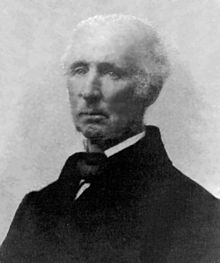Richard Hawes
Richard Hawes (born February 6, 1797 in Bowling Green , Caroline County , Virginia , † May 25, 1877 in Paris , Kentucky ) was an American politician . Between 1837 and 1841 he represented the state of Kentucky in the US House of Representatives . He was also the Confederate Governor of Kentucky from 1862 to 1865 .
Career
Richard Hawes was an older brother of Albert Gallatin Hawes (1804-1849), who also sat for Kentucky in Congress between 1831 and 1837 . He was also a nephew of Aylett Hawes (1768-1833), who represented the state of Virginia in the US House of Representatives between 1811 and 1817. One of his cousins was Aylett Hawes Buckner (1816-1894), who represented Missouri in Congress between 1873 and 1885 .
In 1810, Hawes came to Kentucky with his parents. The family settled near Lexington . Richard attended public schools there. This was followed by studies at Transylvania University . After a subsequent law degree and his admission as a lawyer in 1824, he began to work in Winchester in this profession. He also took part in the Black Hawk War in 1832 . He was a member of the Kentucky House of Representatives in 1828, 1829, and 1834 . In the 1830s he became a member of the Whig Party . In 1834 he ran for the first time, but unsuccessfully, for Congress.
In the congressional elections of 1836 Hawes was then elected to the US House of Representatives in Washington, DC , in the tenth constituency of Kentucky , where he succeeded Chilton Allan on March 4, 1837 . After a re-election in 1838, he was able to complete two terms in Congress until March 3, 1841. In 1843, Richard Hawes moved to Paris, Kentucky, where he practiced as a lawyer. After the Wigs dissolved in the 1850s, he joined the Democratic Party . In 1856 he supported their successful presidential candidate James Buchanan . Four years later he was one of the supporters of the unsuccessful candidate John C. Breckinridge .
At the beginning of the Civil War , Hawes was against Kentucky's secession from the Union. Instead, he advocated the neutrality of the state. When this could no longer be maintained and the majority tended towards the Union, Hawes joined the South . Despite his age, he served in the Confederation Army for a short time . He then joined the Counter-Confederate government and was elected as Counter-Confederate Governor in 1862. He held this title until the end of the war in 1865, although in fact he had no control over the state occupied by Union troops. From 1864 he lived near Richmond , Virginia. His inauguration as Confederate governor in October 1862 had still taken place in Frankfort , the capital of Kentucky. On the same day he and the troops of the south were driven out of the city by the Union army.
After the war he returned to Paris. There his house was destroyed by Union troops. He took an oath of allegiance to the Union and was able to resume his legal career afterwards. In 1866 he became a district judge. In the same year he was hired as a master commissioner at an appeals court. He held this office until his death in 1877. Richard Hawes had been married to Hetty Morrison Nicholas since 1818. Four of his sons fought for the Confederation in the Civil War. One was killed in the process. The son James (1824-1889) was a brigadier general in the Southern Army.
Web links
- Richard Hawes in the Biographical Directory of the United States Congress (English)
- Richard Hawes in the database of Find a Grave (English)
| personal data | |
|---|---|
| SURNAME | Hawes, Richard |
| BRIEF DESCRIPTION | American politician |
| DATE OF BIRTH | February 6, 1797 |
| PLACE OF BIRTH | Bowling Green , Virginia |
| DATE OF DEATH | May 25, 1877 |
| Place of death | Paris , Kentucky |

